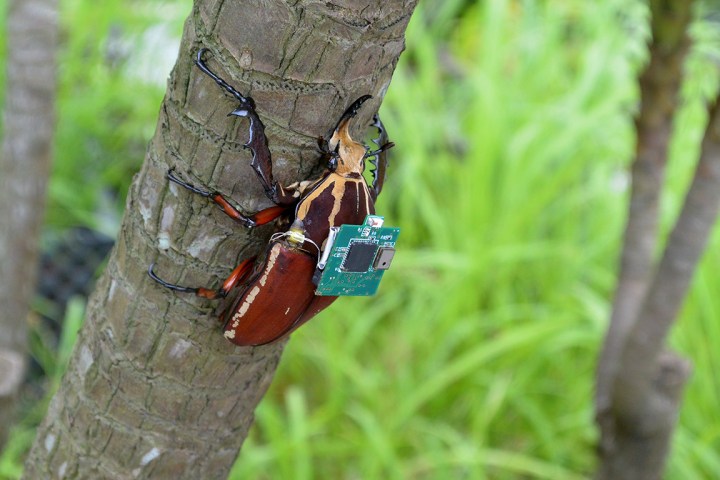
According to the study, giant flower beetles (Mecynorrhina torquoata) can be equipped with microchip backpacks that connect to electrodes plugged into their leg muscles. With subtle impulses, these electrodes allow researchers to manipulate the insects’ movements. Despite effectively acting as high-tech puppets, the bugs are still alive – able to freely roam outside of their backpack’s signal. We can’t say the beetles aren’t harmed in the process, but they do stay alive once the electrodes are removed.
To hack the beetles’ bodies, researchers first studied how the bugs moved. After analyzing speed, gait, and length of step, the researchers inserted electrodes under the bugs’ exoskeletons and examined how different impulses affected the way they walked. By fine tuning these impulses, scientists successfully managed to manipulate the beetles’ movement in fine detail.
It’s a pretty amazing feat, but truth be told, remote-controlled insects aren’t an entirely new invention. The RoboRoach lets DIY insectophiles control cockroaches from their smartphones. Berkeley scientists have flown rhinoceros beetles around like RC helicopters. But researchers Feng Cao, Hirotaka Sato, et al. claim their work demonstrates the first time an insect’s movements have been comprehensively controlled, responding to specific signals to speed up, slow down, take longer strides, shorter strides, and even change their gait.
Researchers believe their insect-computer hybrids have many advantages over man-made robots. For one, they call insects “Nature’s ready-made robot platforms,” with almost no assembly required. Insect-computer hybrids also have a fraction of the power consumption rate as man-made miniature robots, and don’t require the complex control algorithms needed to manipulate mechanical machines.
If these researchers have their way, cyborg insects may one day replace more conventional drones in tasks such as spying and surveillance. Either way, their work has revealed an interesting path for scientists to hack the bodies of beetles — and maybe even human beings.


